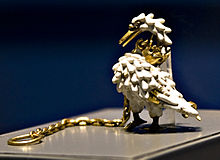- Bastard feudalism
-
Bastard feudalism is a term that has been used to describe feudalism in the Late Middle Ages, primarily in England. Its main characteristic is military, political, legal, or domestic service in return for money, office, and/or influence. The gentry began to think of themselves as the men of their lord rather than of the king; individually they are known as the "retainers", and collectively as the "affinity" of the lord, among other terms.
Contents
History
The term was coined by the historian Charles Plummer in 1885. Plummer blamed bastard feudalism for the disorder and instability of the Wars of the Roses in the fifteenth century. However, Bastard feudalism is primarily associated with his contemporary William Stubbs.[1] According to Stubbs, a shift in English history took place under Edward I when the feudal levy was replaced with royal payment in return for military service by the great magnates who willingly served the king. Thus, instead of vassals rendering military service when required by the lord, they paid a portion of their income into the lord's treasury. In turn the lord would supplement the owed military service with hired retainers, a sort of private army in full time service to the lord.
A strong challenge to the ideas of Stubbs was presented by K. B. McFarlane in the 1940s.[2] McFarlane stripped the term of any negative connotation. To him, what was central to bastard feudalism was not the financial aspect (the sums involved were mostly negligible) but the concept of service in exchange for good favour. In a society governed on a personal basis, service to a lord was the best way to obtain favour in the form of offices, grants, etc. Lords would retain administrators and lawyers, as well as local gentry, into their affinities. By offering money instead of land, lords could afford to retain more followers.
In return for becoming retainers, the gentry would expect to rely on his lord's influence in local and national politics. This practice was known as maintenance. The retainer might wear his lord's livery badge or the grander form, a livery collar, which could be very useful in a courtroom. Under a weak king, such as Henry VI, the rivalries of magnates might spill over from the courtroom to armed confrontations, thereby perverting justice.
Since the crown and the nobility essentially had the same interests at heart, military commissioning of great magnates was not in itself disruptive to society. The civil wars of the 15th century were caused by personal factors (particularly the failings of Henry VI), not by institutional ones. Recent historical research has shown that payment for military service goes back much further than the reign of Edward I, further discrediting the ideas of Stubbs.
Among today's historians, the concept of feudalism is considered problematic, bastard feudalism no less so. The term is therefore used only with caution, although it is not a dead concept. Most historians today would view it as a neutral social system that was open to abuse. Provided that a king was able to control the lords, bastard feudalism could provide a stable way of organising local society. Two points are worth bearing in mind in relation to the Wars of the Roses: a) elements of what is considered bastard feudalism can be identified as early as the beginning of the thirteenth century; b) a weak king was more likely to be vulnerable to magnates made over-mighty by "bastard feudalism".
Because they were rarely kept under arms for long periods, noble retinues were not private armies. Lacking standing armies, kings relied on noble retinues for the military forces they required to conduct wars or crush internal rebellions. Under an inadequate king like Henry VI, ambitious or disaffected magnates like Richard Duke of York or Richard Neville, 16th Earl of Warwick could use their network of servants and retainers to defy or even control the crown. Groups of gentry already coming to blows over local issues, inevitably attached themselves to different patrons. Their private feuds were continued under their leaders' banners and transferred to the battlefields of the Wars of the Roses.
Although Edward IV attempted to limit "retaining", he was largely unsuccessful. However, Henry VII managed to largely overcome bastard feudalism by imposing financial sanctions on unruly nobles. Furthermore, Henry passed a statute in 1504 that only allowed the King to have retainers - nobles had to apply and pay for a licence. Overall, bastard feudalism had mostly disappeared by the end of Henry VII's reign.[citation needed]
See also
References
- ^ William Stubbs. The Constitutional History of England. Oxford: 1875.
- ^ K. B. McFarlane: essays and articles published posthumously as England in the Fifteenth Century London: 1981
Bibliography
- William Stubbs. The Constitutional History of England. Oxford: 1875.
- R L Storey. The End of the House of Lancaster. Sutton: 1966.
- K. B. McFarlane. England in the Fifteenth Century. London: 1981.
- Michael Hicks. Bastard Feudalism. London: 1995.
- John Warren. The Wars of the Roses and the Yorkist Kings. Hodder and Stoughton: 1995.
- Bruce Webber. The Wars of the Roses. UCL Press: 1998.
- John A Wagner. Encyclopedia of the Wars of the Roses. ABC-Clio: 2001.
- David Crouch, 'From Stenton to Macfarlane: Models of Societies of the Twelfth and Thirteenth centuries', Transactions of the Royal Historical Society, 6th series, 5 (1995).
- David Crouch The Birth of Nobility: Constructing Aristocracy in England and France, 950-1300. Harlow, 2005.
- Castor, Helen. The king, the crown, and the Duchy of Lancaster: public authority and private power, 1399-1461, Oxford University Press, 2000, ISBN 0198206224, 9780198206224. Google books
External links
Categories:- Late Middle Ages
- Feudalism in England
Wikimedia Foundation. 2010.

